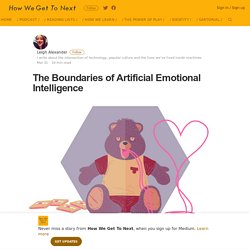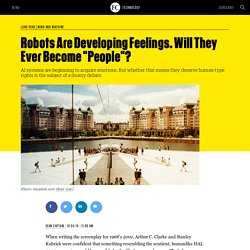

How We Feel About Robots That Feel. Octavia, a humanoid robot designed to fight fires on Navy ships, has mastered an impressive range of facial expressions.

Walmart is developing a robot that identifies unhappy shoppers. Disney’s Next Movie Could Be Watching You, Too. There’s this term in the processed food industry for when something is quantifiably at its most delicious, but also–critically–still unsatisfying enough that you always crave more.

The Boundaries of Artificial Emotional Intelligence. I’m told I should prepare for the day an artificial intelligence takes my job.

This will leave me either destitute and rootless or overwhelmed by a plenitude of time and existential terror, depending on whom you ask. It’s apparently time to consider what kind of work only humans can do, and frantically reorient ourselves toward those roles — lest we be left standing helplessly, as if at the end of some game of robot musical chairs. Emotional labor is a form of work less often considered in these automated future projections. Perhaps this is because it’s intangible, difficult to quantify and monetize. In no small part, efforts that involve giving care, carrying a burden, and taking responsibility for the function or well-being of others go unnoticed in the same way a lot of “women’s work” does—though in recent years talk of its hidden costs has gained momentum in the labor inequality conversation. Chatbots with Social Skills Will Convince You to Buy Something. The descendants of Alexa and Siri might come with a surprisingly good sales pitch.
I met an early version of such a persuasive chatbot at a tech conference in Pittsburgh recently. After some small talk and jokes, the bot, called Sara, recommended some other people for me to meet. The suggestions were in fact excellent, and if I hadn’t just met with them already, I would’ve followed her lead. Sara was developed by Justine Cassell, director of human-computer interaction at Carnegie Mellon University, who is studying ways for virtual agents to use subtle cues in conversation to build rapport with people and become more effective at conveying information or persuading them to do something. Nextgov. Algorithms Can Tell Bosses How Employees Are Feeling. Every day, humans type out more than 200 billion emails, hundreds of millions of tweets, and innumerable texts, chats, and private messages.

No one person could pick through even a tiny sliver of this information and stitch together themes and trends—but computers are starting to be able to. For more than a decade, researchers have been developing computer programs that can ingest enormous amounts of writing to try and understand the emotions stirred up by an idea or a product. The field—known as sentiment analysis—got its start in market research. As online reviews started to gather steam in the mid-2000s, companies who wanted to understand how their products—or their competitors’ offerings—were being received began to use algorithms to aggregate reviews, says Bing Liu, a professor of computer science at the University of Illinois, Chicago, who has written extensively about the history of sentiment analysis.
Robots Are Developing Feelings. Will They Ever Become "People"? When writing the screenplay for 1968's 2001, Arthur C.

Clarke and Stanley Kubrick were confident that something resembling the sentient, humanlike HAL 9000 computer would be possible by the film's namesake year. That's because the leading AI experts of the time were equally confident. Clarke and Kubrick took the scientific community's predictions to their logical conclusion, that an AI could have not only human charm but human frailty as well: HAL goes mad and starts offing the crew. Intelligence artificielle : une machine peut-elle ressentir de l’émotion ? Certains programmes savent déjà les imiter à la perfection et même influer sur nos propres émotions.

Le Monde.fr | • Mis à jour le | Par Morgane Tual Cet article fait partie d’une série consacrée à l’état des lieux de l’intelligence artificielle. La science-fiction nous abreuve de robots autonomes, si perfectionnés qu’ils disposent d’une conscience, d’émotions et nous inspirent même de l’empathie, à l’instar des êtres humains. Mais loin de la littérature et d’Hollywood, qu’en est-il aujourd’hui dans les laboratoires du monde entier ? L’émotion, et la conscience, apparaissent comme des éléments essentiels pour fabriquer une machine à l’image de l’être humain. . « La vie intérieure, on ne sait pas ce que c’est » How Artificial Intelligence Is Evolving Outdoor Advertisements. A new prototype billboard has been designed to respond to the emotions of passersby M&C Saatchi partnered with outdoor advertising experts Clear Channel and Posterscope to evolve a traditional channel: outdoor advertisements.

The companies worked together to test a unique algorithm using a Microsoft Kinect camera, which would help them gauge consumer sentiment when looking at a bus shelter ad. The agency’s began by asking lofty questions such as “how can we create the most attention grabbing advert?” Les trackers émotionnels, nouvelles coqueluches du monde des wearables. Ces bracelets et bagues connectés capables d'analyser les émotions de leurs utilisateurs vont bientôt déferler sur le marché grand public.

Ils intéressent aussi les professionnels. Solutions - Emotion Research Lab. Moodies App Understands Your Feelings. Sensaura Tech – Life. As You Feel It. Machine Learning Can Help Kids with Autism Recognize Emotions. Design EMail share share Doc PDF | PPTX Doc.

At the Heart of Facebook’s Artificial Intelligence, Human Emotions. Yann LeCun, director of AI Research at Facebook, and professor of computer science at New York University.

Facebook Facebook Inc. doesn’t yet have an intelligent assistant, like the iPhone’s Siri. Fastcompany. An emotional crisis doesn't surface only in a therapy appointment. For those suffering depression, PTSD, or other mental health challenges, a breakdown can be a slow burn, developing over days or weeks in between doctor visits. Delay in treatment can have lasting consequences. "Very likely, every single episode of depression or mania is going to damage your brain a little more," says Thilo Deckersbach, a Harvard psychology professor who practices at Massachusetts General Hospital. The hospital's online MoodNetwork recruits patients with major depression and bipolar disorder for clinical studies, including a new one with the Boston-based artificial intelligence company Cogito. They are testing the ability of a mobile app called "Companion" to flag early signs of trouble by monitoring activities like patients' movement, calling and texting behavior, and the way they speak.
Electronic 'Tattoo' Can Monitor Muscle Activity and Map Emotions. In Brief A new temporary "electronic tattoo" was developed by Tel Aviv University to measure the activity of muscle and nerve cells, possibly revolutionizing medicine, rehabilitation, and even business and marketing research. Not For Artistic Expression Researchers at the Tel Aviv University have developed a new temporary “electronic tattoo” that can measure the activity of muscle and nerve cells.
The tattoo is made of a carbon electrode, an adhesive surface that attaches to the skin, and a nanotechnology-based conductive polymer coating that enhances the electrode’s performance. It can record a strong, steady signal for hours on end without irritating the skin. One major application of the new electrode is the mapping of emotion by monitoring facial expressions through electric signals received from facial muscles. Lead researcher Prof.
“Researchers worldwide are trying to develop methods for mapping emotions by analyzing facial expressions, mostly via photos and smart software,” Prof. Pepper the robot gets even smarter with IBM technology. Credit SoftBank Pepper the robot sold out in just one minute when it was launched last year, with consumers keen to snap up a model of the emotion-reading companion. Now, with the help of IBM's Watson system, Pepper is set to get smarter than ever. Unlike functional robots, which are able to help with domestic chores such as dish washing or hoovering, Pepper is intended to interact with humans; this could involve greeting customers in a shop or operating self-service kiosks. Pepper is designed to understand human emotions -- exhibited through facial expression, body language and words -- and adapt to it. Why computers need empathy for the human condition: Daniel McDuff on affective computing.
Are you addicted to social media? Daniel McDuff has a shocking solution -- literally. Daniel McDuff works at the MIT Media Lab -- also home to fellow WIRED 2015 speaker Hiroshi Ishii -- where he builds scalable tools to enable the automated recognition of emotions and physiology. One of the instruments he designed was the 'Pavlov Poke', a tool designed to wean users off addictive social media sites. McDuff, who is a WIRED Innovation Fellow, worked with Robert Morris to create code that will display on-screen alert if a distracting site is visited too frequently. What is adaptive content? In the first of a five-question guide to adaptive content, we ask Noz Urbina, content strategist and founder of Urbina Consulting, to explain adaptive content, and how it creates both efficiencies for businesses and more relevant content for customers. Artificial Emotions - Issue 1: What Makes You So Special. When Angelica Lim bakes macaroons, she has her own kitchen helper, Naoki.
Her assistant is only good at the repetitive tasks, like sifting flour, but he makes the job more fun. Naoki is very cute, just under two feet tall. He’s white, mostly, with blue highlights, and has speakers where his ears should be. The little round circle of a mouth that gives him a surprised expression is actually a camera, and his eyes are infrared receivers and transmitters. “I just love robots,” says Lim, a Ph.D. student in the Department of Intelligent Science and Technology at Kyoto University in Japan. Emotional Intelligence in Design — Facebook Design. Emotional intelligence is defined with five characteristics: Self awarenessSelf regulationMotivationEmpathyPeople skills. You Sound Sad, Human — Pacific Standard. I tried three apps that claim to make you more likable—and am now addicted to one of them. Fastcodesign. Toyota's Kirobo Mini - Toyota Europe. Ever since the astronaut robot Kirobo returned to Earth from his international space mission, we’ve been developing ways for him to assist us with innovative forms of communication to make our lives easier.
MIT's Daniel McDuff WIRED2015 talk: emotional computers. Affective Computing and Adaptive Help. Several months ago, I saw Dr. The Chatbot That's Acing the Largest Turing test in History. One night in late July 2014, a journalist from the Chinese newspaper Southern Weekly interviewed a 17-year-old Chinese girl named Xiaoice (pronounced Shao-ice). The journalist, Liu Jun, conducted the interview online, through the popular social networking platform Weibo. In pursuit of empathetic machines. Sony is Working on a Robot Capable of an 'Emotional Bond' Amazon Working on Making Alexa Recognize Your Emotions. Machine Learning Algorithm Spots Depression in Speech Patterns. Amazon's virtual assistant Alexa will analyse emotions in user's voices. How Emotion Tracking Startups Lightwave and Affectiva Are Turning Mind-Reading Into a Reality. What Interface Will Replace Keyboards and Touch Screens?
How mining human emotions could become the next big thing in tech: Measurement and sharing. Broekens Bosse Marsella 2013. Your Apple Watch can now tell if you're happy or sad. Pplkpr. Future - Would you let an algorithm manage your relationships? A Technology That Reveals Your Feelings. Apple Acquires Emotion Recognition Specialist Emotient. Your Computer Will Feel Your Pain. What is Affective Computing? Computing all the Feels — Digital Culturist.
How open government can turn evil thanks to big data and machine learning. This Tiny Robot Lets You Play God With Huge AI. Dubai Municipality implements happiness index to evaluate services. Dubai wants to be 'world's happiest city'. Report says it has a long way to go. We Know How You Feel. What is Affective Computing? Robots affectifs : naissance de l’empathie artificielle. Affective computing: How 'emotional machines' are about to take over our lives. The Internet of Emotions: Putting the person back into personalization. This Canadian Startup Can Track Your Emotions Through a Fitness Monitor. Scientists are on the verge of creating an EMOTIONAL computer. What is Affective Computing And How Could Emotional Machines Change Our Lives?